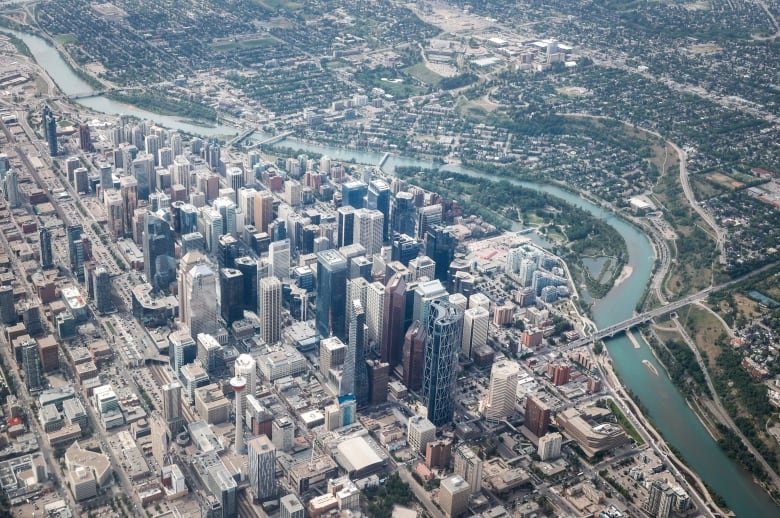Calgary’s rental market has gone through a major shift in recent years.
While Calgary is still relatively affordable compared to Toronto and Vancouver, large swaths of people moving to the city in search of cheaper real estate have squeezed vacancy rates and pushed rental prices up at a faster rate than anywhere else in the country in 2023.
But some say the height of the market may have come and gone, and that the trend of rapid growth now seems to be tapering off.
“We have to be realistic — I think we have peaked here right now,” said Mike Bucci, vice-president with the Western-Canada based Bucci Developments, speaking on the sidelines of the Calgary Real Estate Forum this week. “Renters have choice now.”
Rentals.ca data shows rents in Calgary have declined over the past two months, a shift that’s all the more striking given the dip happened in August and September, said Giacomo Ladas, the website’s associate director of communications.
“Typically, August is the busiest rental month because that’s where you get the surge, especially students who are looking for permanent rentals,” said Ladas. “That didn’t really happen in Calgary.”
Another indicator: Some property managers have started offering move-in bonuses and other incentives, Ladas said, which had gone by the wayside during the peak of the competitive market.
Kyle Dovigi, a Toronto-based real estate broker who invests in the Calgary condo market, said he, too, has noticed a change.
“Rents were incredibly strong — probably the highest they’ve ever been — earlier this year,” said Dovigi.
“Fifteen people [would] be going to see a unit at a time. It would be renting the day that it gets posted … that has definitely weakened over the last six months,” he said, though he noted prices remain “very strong overall.”
A similar trend has unfolded at a national level with rents across many major cities dipping in recent months, while smaller markets have seen more growth.
What’s changed?
Demand for rentals has been on the rise in Calgary, but so, too, has new housing supply.
Last year, Calgary saw an all-time record in new housing starts, according to the Canada Mortgage and Housing Corporation, much of that driven by new apartment construction.
Mark Parsons, chief economist at ATB Financial, said the construction sector has been playing catch-up in response to demand for new housing driven by the province’s population boom.
“It is very significant,” said Parsons. “The multifamily is really in response to demand for lower cost housing created by migration.”
Parsons said that trend is expected to continue with about 45,000 new housing starts expected in Alberta both this year and next.
“[There’s] more choice,” said James Ha, president of the Boardwalk REIT. “Over the last couple of years, we’ve seen the housing market that had much lower vacancy. Today, we’re seeing more availability in these newly developed apartment communities.”
Another factor that could affect rents going forward: Slower population growth tied to the federal government’s new limits on temporary and permanent immigration.
Parsons, with ATB, believes the recently announced changes will moderate Alberta’s population growth to about two per cent next year, meaning less pressure on housing.

There’s some question about whether the current softening in the rental market marks a long-term shift or a short-term pause.
As more housing supply comes online, Calgary is heading to a more balanced rental market, according to Richie Bhamra, executive vice-president with CBRE. But he said it remains to be seen if new housing construction will be able to continue to keep up with demand, given how high construction costs have climbed in recent years.
“To make economic sense of developments, we’re going to continue to see upward pressure on rents,” said Bhamra.
“I think we’re in somewhat of a balanced market right now. We just need to make sure that that continues with balanced construction.”
Interest shifts to Edmonton
Parsons said he believes population growth in this province will also likely remain higher than in other parts of the country.
“We expect that we’re going to continue to see people come from the rest of Canada, particularly from more expensive markets like Vancouver and Toronto,” said Parsons.
In a followup email, the ATB chief economist said he believes rents in Alberta may not have peaked yet though they likely will begin to moderate.
He added that the trend of driving or flying in search of cheaper rent has pushed people to another spot in the province: Edmonton.
According to the latest report from Rentals.ca, apartment rents in that city grew 12 per cent — the fastest pace in the country.
“We’re seeing signs that people are chasing affordability within the province and moving to the lower cost as well within Alberta,” said Parsons.



